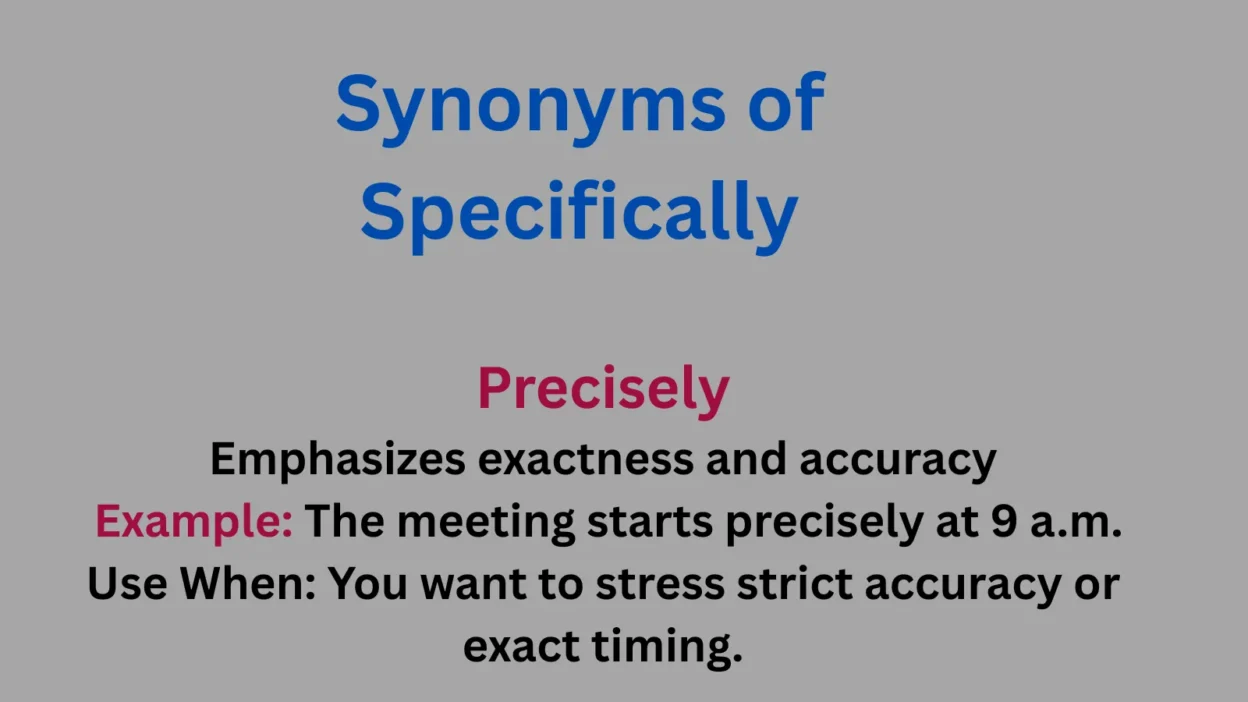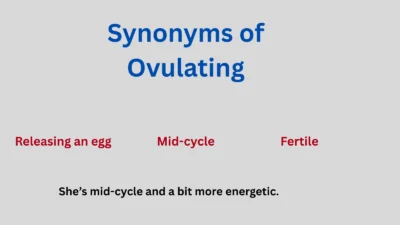Synonyms of specifically help you highlight precision or focus, such as explicitly, particularly, or in detail. For example, she asked specifically for almond milk in her coffee. Using the right synonym of specifically lets you zoom in on exact points, clarify instructions, or emphasize details. Each word adds its level of sharpness and clarity.
If you’re explaining directions, emphasizing a fact, or narrowing down a topic, choosing accurate synonyms for specifically keeps your communication clear and direct.
In this article, you’ll get the meaning and example sentence for each synonym of specifically, so you can express precision with confidence. Ready to break it down precisely? Let’s go!
What Does Specifically Mean?
Specifically means in a way that is exact, detailed, or clear about something particular. When you say “specifically,” you’re zeroing in on one exact thing instead of being vague or general. It’s like shining a spotlight on one detail.
For example, if someone asks, “Which fruit do you like?” and you reply, “Specifically, I like mangoes,” you’re focusing on one exact type of fruit.
Key Nuances of Specifically:
- Precision: It narrows down general ideas to exact points.
- Formality: Often used in formal or clear explanatory contexts.
- Neutral tone: It’s neither emotional nor casual—just factual and direct.
30 Synonyms of Specifically, With Examples and Usage Tips
Below are 30 alternatives to specifically, each with a quick definition, an example sentence, and advice on when it fits best.
1. Particularly
Focuses on one or more items as important or notable
Example: I enjoy many sports, but I particularly love tennis.
Use When: You want to emphasize importance or preference, often with a mild emotional tone.
2. Precisely
Emphasizes exactness and accuracy
Example: The meeting starts precisely at 9 a.m.
Use When: You want to stress strict accuracy or exact timing.
3. Explicitly
Clearly and fully expressed without room for doubt
Example: She explicitly stated her requirements in the contract.
Use When: Clarity and unambiguity are important, often in legal or formal contexts.
4. Exactly
Matches the fact or idea completely
Example: That’s exactly what I meant.
Use When: To affirm correctness or agreement without any deviation.
5. Namely
Introduces a specific name or detail after a general statement
Example: Three countries, namely Canada, Mexico, and Brazil, will attend.
Use When: Listing or clarifying specific items following a broad category.
6. Strictly
Indicates rigorous adherence or limitation
Example: This policy applies strictly to full-time employees.
Use When: Highlighting rules or boundaries, often with a formal tone.
7. Exclusively
Means only or solely
Example: This offer is exclusively for new customers.
Use When: To express limitation or restriction to one group or thing.
8. Solely
Emphasizes a single cause or reason
Example: The success was solely due to her hard work.
Use When: To stress one unique factor or focus.
9. In particular
Draws attention to a specific item or detail
Example: I love European cities, Paris in particular.
Use When: Informally highlighting something among others.
10. To be exact
Adds a precise detail or correction
Example: The total cost is $150, to be exact.
Use When: Offering clarity or correction in casual speech.
11. To wit
Legal or formal phrase meaning ‘that is to say’
Example: He refused the offer, to wit, the contract proposal.
Use When: Writing formal, legal, or old-fashioned text.
12. In detail
Refers to covering every part or aspect fully
Example: She explained the process in detail.
Use When: Indicating thoroughness or completeness.
13. Precisely speaking
Emphasizes the exactness of the statement
Example: Precisely speaking, the species is endangered.
Use When: Offering a more formal clarification.
14. Specifically speaking
Similar to precisely speaking, with a focus on specificity
Example: Specifically speaking, the issue lies in the software update.
Use When: Formal or technical contexts needing precision.
15. Markedly
Noticeable or distinct
Example: The temperature dropped markedly overnight.
Use When: To emphasize a clear difference or change.
16. Explicitly stated
Clearly expressed without confusion
Example: The rules are explicitly stated in the handbook.
Use When: Clarity is essential, especially in instructions or policies.
17. Distinctly
Clearly perceived or recognized
Example: I distinctly remember the moment.
Use When: To emphasize clear memory or perception.
18. Unambiguously
Without any doubt or multiple interpretations
Example: The instructions were unambiguously clear.
Use When: Emphasizing total clarity, often in technical writing.
19. In a nutshell
Summarizing something briefly and clearly
Example: In a nutshell, the project failed due to poor planning.
Use When: Informal, summarizing complex information.
20. Namely stated
Similar to ‘namely,’ but emphasizing the act of stating
Example: The items, namely stated in the list, are on sale.
Use When: Formal writing needing specific identification.
21. As such
Indicates something in its exact nature or role
Example: He is the manager and, as such, is responsible for decisions.
Use When: Clarifying role or status.
22. Precisely defined
Clearly and exactly described
Example: The term is precisely defined in the glossary.
Use When: Academic or technical contexts.
23. More specifically
Introduces a more detailed or narrowed statement
Example: I like sports; more specifically, basketball.
Use When: Adding detail or clarification in conversation.
24. In essence
The most important aspect or core
Example: In essence, the plan aims to reduce costs.
Use When: Summarizing or getting to the core meaning.
25. In a strict sense
Taking words or facts exactly, without flexibility
Example: In a strict sense, the rule applies only to adults.
Use When: Formal contexts needing exactness.
26. At heart
Refers to the true nature or essential character
Example: She’s a teacher at heart.
Use When: Emotional or personal contexts emphasizing essence.
27. In so many words
Expressing something directly or explicitly
Example: He didn’t say it in so many words, but he disapproved.
Use When: Informal speech or writing.
28. To the letter
Following instructions or rules exactly
Example: She followed the recipe to the letter.
Use When: Emphasizing strict adherence.
29. Exemplarily
Serving as an example
Example: The teacher acted exemplarily in the situation.
Use When: Praising or setting an example.
30. Notably
Significantly or importantly
Example: Notably, the study was funded by several institutions.
Use When: Highlighting important details or facts.
How to Choose the Right Synonym for Specifically
Choosing the right synonym depends on:
- Tone: Formal words like explicitly, unambiguously, or to the letter work well in professional or academic writing. More casual words, like in a nutshell or more specifically, suit informal conversations.
- Context: If you’re focusing on rules or strict limits, use strictly, exclusively, or solely. For emotional or personal nuances, fits better at heart.
- Clarity: Use precisely or explicitly when you want no confusion. For summaries, in essence or in a nutshell, it works well.
- Cultural nuances: Some phrases, like to wit are considered old-fashioned or legalistic in English-speaking cultures, so avoid them unless fitting.
Conclusion
Expanding your vocabulary with synonyms of specifically can add richness and precision to your writing and speech. If you want to sound formal, casual, emotional, or strict, there’s an alternative that fits your tone and purpose.
Remember to consider the subtle differences in meaning and context before selecting your word — this will make your communication clear and effective.
Next time you want to zero in on a detail, try one of these 30 alternatives and watch your writing become sharper and more engaging!




